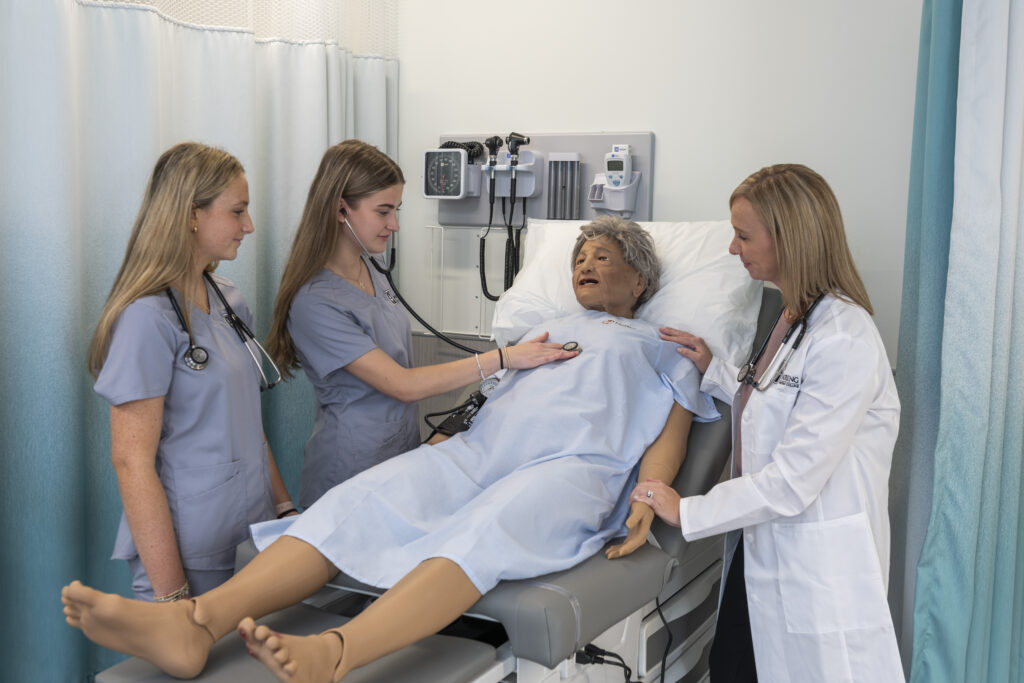Nursing Major

The distinctive Providence College bachelor of science in nursing program provides a best-in-class nursing education. With a mission-focused approach that is aligned with our Catholic and Dominican identity, the PC nursing student is formed through a focus on caring for the whole person – ensuring that students gain competencies that address physical, mental, and spiritual health for all people entrusted to their care.
The PC nursing program is comprised of comprehensive clinical opportunities that allow students to gain skills and build competencies as they explore their interests and develop their passion for caring for others, while simultaneously engaging in the liberal arts through the college’s core curriculum, PC’s Development of Western Civilization Program, and student-selected electives.
Program Learning Outcome
Program Learning Outcomes (PLOs) describe what our graduates will do with the knowledge gained throughout the nursing curriculum. They are critical to ensuring that graduates are fully equipped with the necessary knowledge, skills, and attitudes for professional nursing practice. These outcomes serve as a guide to preparing students for success in both the NCLEX-RN and their future nursing careers. By focusing on holistic care, evidence-based practices, collaboration, ethical decision-making, and lifelong learning, the PLOs help shape well-rounded nurses who are ready to meet the healthcare needs of diverse populations. These outcomes not only support immediate career readiness but also provide a foundation for continued professional growth and advanced education.
- Integrate clinically relevant, holistic care for individuals, families, communities, and populations across the continuum of care and within complex systems that reflects diversity, equity, and inclusion to promote, protect, and improve health, well-being, and quality of life.
- Provide evidence-based nursing care through the analysis and integration of informatics, data, emerging science, and patient/client/population preferences across the lifespan and in all spheres of care.
- Collaborate with interdisciplinary members of the health care team through effective communication, partnership, and leadership to promote safe and cost-effective high-quality care.
- Integrate conceptual and theoretical nursing expertise, employing clinical judgment to guide nursing practices that adhere to ethical and legal principles and conduct.
- Engage in ongoing personal and professional development through lifelong learning and advocacy to advance the goals of the nursing profession in a manner that is consistent with the Catholic and Dominican Tradition.
Example Four-Year Plan of Study
Year 1
Fall
- Development of Western Civilization (semester I)
- Anatomy and Physiology I with Lab
- Introduction to Psychology
- Writing Core Course
Spring
- Microbiology for Health Professions with Lab
- Development of Western Civilization (semester II)
- Anatomy and Physiology II with Lab
- Introduction to Professional Nursing
- Core Course THL 200
Year 2
Fall
- Development of Western Civilization (semester III)
- Nursing Fundamentals and Health Assessment with Lab
- Nutrition and Disease Prevention
- General, Organic, and Biochemistry Survey
Spring
- Pathopharmacology I
- Development of Western Civilization Colloquia
- Medical Surgical Nursing I with Clinical
- PHL Ethics Core
Year 3
Fall
- Medical Surgical Nursing II with Clinical
- Pathopharmacology II
- Introduction to Statistics
- Core Course THL 300
Spring
- Healthcare Equity in the US
- Maternal Newborn Nursing with Clinical
- Pediatric Nursing with Clinical
- Nursing Research & Evidence-Based Practice
Year 4
Fall
- Psychiatric Mental Health Nursing with Clinical
- Public Health Nursing & Health Promotion in the Community with Clinical
- Transition to Professional Nursing
- Core Course PHL
Spring
- Complex Nursing Problems
- Nursing Capstone Internship & Seminar
- NCLEX-RN Preparation
- Fine Arts Core
Department of Nursing
Mondor Center 325
401-865-2320
nursing@providence.edu
BSN NURSING CURRICULUM
- Intro to Professional Nursing
- Nursing Fundamentals and Health Assessment with Lab
- Nutrition and Disease Prevention
- Medical Surgical Nursing I with Clinical
- Pathopharmacology I
- Medical Surgical Nursing II with Clinical
- Pathopharmacology II
- Maternal Newborn Nursing with Clinical
- Pediatric Nursing with Clinical
- Nursing Research & Evidence-Based Practice
- Psychiatric-Mental Health Nursing with Clinical
- Public Health Nursing and Health Promotion in the Community with Clinical
- Transition to Professional Nursing
- Complex Nursing Problems
- Nursing Capstone Internship and Seminar
- NCLEX-RN Preparation





